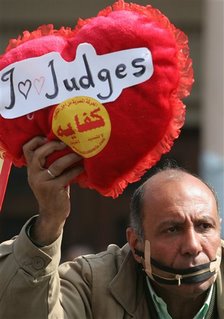 Since Monday, thousands of tax collectors from the Real Estate Tax Authority have made a downtown street their home. They've converged on Cairo from all over the country to stage a massive sit-in in front of the Cabinet building. Their demands: wage parity with their better-paid colleagues in the General Tax and Sales Tax Authorities, and transferring their affiliation from the corruption-ridden municipal governments to the Finance Ministry (a demand they've made since 1976). Real estate tax collectors in the provinces are refraining from all revenue collection until their demands are met.
Since Monday, thousands of tax collectors from the Real Estate Tax Authority have made a downtown street their home. They've converged on Cairo from all over the country to stage a massive sit-in in front of the Cabinet building. Their demands: wage parity with their better-paid colleagues in the General Tax and Sales Tax Authorities, and transferring their affiliation from the corruption-ridden municipal governments to the Finance Ministry (a demand they've made since 1976). Real estate tax collectors in the provinces are refraining from all revenue collection until their demands are met. al-Karama's talented Peter Alfred has kindly shared these photos of the strike and sit-in. Peter has beautifully captured the determination, the humour, and the solidarity of these humble public functionaries, their refusal to cave in to the entreaties and threats of amn al-dawla and various nervous official emissaries.
al-Karama's talented Peter Alfred has kindly shared these photos of the strike and sit-in. Peter has beautifully captured the determination, the humour, and the solidarity of these humble public functionaries, their refusal to cave in to the entreaties and threats of amn al-dawla and various nervous official emissaries. As with the second Mahalla strike in Ramadan, hundreds of women civil servants are out in full force, braving the cold winter air and shattering tired stereotypes; they're camping out day and night alongside their male co-workers. What do state feminists, "women's empowerment" do-gooders, and assorted ladies who lunch have to say about that? Oh that's right, nobody cares what they think.
As with the second Mahalla strike in Ramadan, hundreds of women civil servants are out in full force, braving the cold winter air and shattering tired stereotypes; they're camping out day and night alongside their male co-workers. What do state feminists, "women's empowerment" do-gooders, and assorted ladies who lunch have to say about that? Oh that's right, nobody cares what they think. Also out in full force is the indefatigable Kamal Abu Eita, citizen-activist extraordinaire. Like Kamal Khalil, Abu Eita is a fixture at nearly every street protest in Egypt in the past 10 years. But he does have a day job, and it is in fact as a tax collector for the Real Estate Tax Authority, so this protest hits very close to home. Abu Eita is a walking treasure trove of information and insight about this most unusual and most significant of public protests.
Also out in full force is the indefatigable Kamal Abu Eita, citizen-activist extraordinaire. Like Kamal Khalil, Abu Eita is a fixture at nearly every street protest in Egypt in the past 10 years. But he does have a day job, and it is in fact as a tax collector for the Real Estate Tax Authority, so this protest hits very close to home. Abu Eita is a walking treasure trove of information and insight about this most unusual and most significant of public protests. Why is it significant? Because it's probably the largest and most coordinated strike action by functionaries of the Egyptian state in modern times. Because it opens a fascinating window onto the mysterious workings of a mammoth bureaucracy. Because it has the potential to cripple the state's lifeline (no revenue, no state). And because it's part of a grand wave of social protest that has been sweeping the country for nearly a decade.
Why is it significant? Because it's probably the largest and most coordinated strike action by functionaries of the Egyptian state in modern times. Because it opens a fascinating window onto the mysterious workings of a mammoth bureaucracy. Because it has the potential to cripple the state's lifeline (no revenue, no state). And because it's part of a grand wave of social protest that has been sweeping the country for nearly a decade. Stay tuned.
Stay tuned.











































